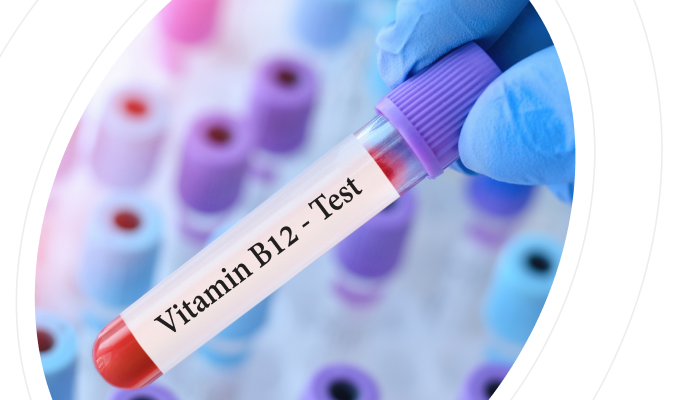What Is Vitamin B12?
Vitamin B12 is a water-soluble nutrient naturally found in certain foods and often added to others or available in supplement form. Compounds with vitamin B12 activity, collectively known as cobalamins, contain the mineral cobalt. Methylcobalamin and 5-deoxyadenosylcobalamin are the active forms of vitamin B12, while hydroxycobalamin and cyanocobalamin become biologically active upon conversion to methylcobalamin or 5-deoxyadenosylcobalamin.
What Is Vitamin B12 Responsible For?
Vitamin B12 is essential for maintaining nerve health, supporting brain function, and preventing megaloblastic anemia. It also helps in the metabolism of protein and fats, as well as the production of neurotransmitters. This essential vitamin plays crucial roles in the development and function of the central nervous system, red blood cell formation, and DNA synthesis. It serves as a cofactor for enzymes like methionine synthase, facilitating the conversion of homocysteine to methionine, a vital amino acid. Methionine is integral for the production of S-adenosylmethionine, a methyl donor for numerous cellular processes involving DNA, RNA, proteins, and lipids. Additionally, vitamin B12 aids in the metabolism of propionate, a short-chain fatty acid, by facilitating the conversion of L-methylmalonyl-CoA to succinyl-CoA
Vitamin B12 Test Price in Dhakuria - Compare Prices at 22 Labs
Name
Proc. Time
Rating
Price
How Is Vitamin B12 Absorbed By The Body?
Vitamin B12 found in food is initially bound to protein and must undergo several steps to be absorbed by the body. Upon ingestion, saliva in the mouth begins the process of releasing vitamin B12 from its protein matrix. This freed vitamin B12 then attaches to haptocorrin, a cobalamin-binding protein present in saliva. Further liberation of vitamin B12 occurs in the stomach which is facilitated by hydrochloric acid and gastric protease. In the duodenum, digestive enzymes release vitamin B12 from haptocorrin, allowing it to bind with intrinsic factor, a transport protein secreted by the stomach's parietal cells. This complex is then absorbed in the distal ileum through receptor-mediated endocytosis. However, vitamin B12 added to foods or dietary supplements is already in its free form and does not require these steps.
Recommended intake guidelines for vitamin B12 are outlined below based on age and gender. These include:
Recommended Dietary Allowance (RDA) :
The average daily intake level deemed sufficient to fulfil the nutrient needs of nearly all (97%–98%) healthy individuals, commonly utilized for devising nutritionally adequate diets for individuals.
Adequate Intake (AI) :
Intake at this level is assumed to guarantee nutritional adequacy, established in instances where evidence is insufficient to establish an RDA.
Estimated Average Requirement (EAR) :
The average daily intake level estimated to meet the needs of 50% of healthy individuals, typically employed for assessing nutrient intake among groups & devising nutritionally adequate diets for them. It can also be utilised to evaluate nutrient intake of individuals.
Tolerable Upper Intake Level (UL) :
The maximum daily intake expected to avoid adverse health effects.
Recomended Dietary Allowances (RDAs) For Vitamin B12
| Age | Male | Female | Pregnancy | Lactation |
|---|---|---|---|---|
| Birth to 6 months | 0.4mcg | 0.4mcg | ||
| 7-12 Months* | 0.5mcg | 0.5mcg | ||
| 1-3 Years | 0.9mcg | 0.9mcg | ||
| 4-8 Years | 1.2mcg | 1.2mcg | ||
| 9-12 Years | 1.8mcg | 1.8mcg | ||
| 14-18 Years | 2.4mcg | 2.4mcg | 2.6mcg | 2.8mcg |
| 19+ Years | 2.4mcg | 2.4mcg | 2.6mcg | 2.8mcg |
What Is A Vitamin B12 Test?
A vitamin B12 test, also known as a cobalamin test, measures the levels of vitamin B12 in the blood to assess its adequacy for normal bodily functions such as maintaining a healthy nervous system, making red blood cells, and creating DNA, the genetic material in all of our cells. In other words, the aim of vitamin B12 testing is to ascertain whether there is a deficiency or lower-than-optimal levels of B12 present in your system. Sometimes, the assessment of vitamin B12 levels is conducted individually, while in other instances, it is included with other tests to diagnose or monitor specific health conditions. A deficiency in Vitamin B12, indicating insufficient levels of this crucial nutrient, can lead to various health complications like anemia & nervous system disorders. There are several factors that can contribute to low Vitamin B12 levels, such as inadequate dietary consumption, medication usage, aging, or conditions hindering the absorption of Vitamin B12 from food.
To conduct a Vitamin B12 test, a blood sample is required. Your physician may request a vitamin B12 test if you exhibit symptoms of anemia or neurological issues such as cognitive alterations, weakness, impaired balance, or sensations of numbness, pain, and tingling in the extremities. Additionally, it may be ordered as a follow-up if a previous blood test indicates the presence of megaloblastic anemia, characterised by abnormally large and dysfunctional red blood cells. Analysing your Vitamin B12 level assists healthcare providers in identifying potential deficiencies and suggesting suitable treatments.
Who Should Get Tested?
Testing typically occurs when symptoms indicative of a vitamin B12 deficiency, such as anemia or neurological issues, manifest. Certain individuals face an increased susceptibility to a vitamin B12 deficiency owing to factors like age or underlying medical conditions. As a result, they may undergo routine vitamin B12 testing to assess their levels and ensure they remain within the normal range.
Common indications of a vitamin B12 deficiency might encompass:
Additionally, individuals with specific medical conditions or lifestyle factors that heighten the risk of developing a vitamin B deficiency may require vitamin B testing. These circumstances include:
Celiac disease or Crohn's disease
Alcohol use disorder (AUD)
Malabsorption syndrome
Older age (75+ years)
Dietary patterns lacking in vitamin B-rich foods, such as animal products (meat, eggs, dairy foods)
History of gastrointestinal surgery, including gastric bypass surgery for weight management
Use of certain medications that impact the body's utilisation of specific B vitamins
Individuals at higher risk of encountering reduced levels of vitamin B12 include older adults, children, individuals following vegan or vegetarian diets, individuals with diabetes, those who have undergone gastric bypass surgery, breastfeeding women, and individuals with conditions affecting absorption like Crohn’s disease. Your physician is best equipped to evaluate the complexities surrounding the necessity for vitamin B12 testing as many symptoms overlap with other medical conditions and may necessitate diverse forms of screening.
How Is This Test Done?
Vitamin B levels can be assessed through blood or urine analysis.

BLOOD TEST
For a blood test, a healthcare professional will draw blood from a vein in your arm using a small needle. After insertion, a small blood sample will be collected into a test tube or vial. You may experience a slight sting during needle insertion or withdrawal. This process takes less than 5 minutes.

URINE TEST
In the case of a urine test, you may undergo either a random urine test or a 24-hour urine sample test. For a random urine test, you'll provide a single urine sample at any time of the day, usually at your healthcare provider's office or a laboratory. While in a 24-hour urine sample test, you'll need to gather all your urine over a 24-hour period. You'll receive a specialised container for urine collection along with instructions on proper collection and storage.
Your provider will specify the start time. The process typically involves the following steps:
Begin by urinating as usual & refrain from collecting this urine. Record the time of urination.
Over the next 24 hours, collect all urine in the provided container.
During the collection period, store the urine container in a refrigerator or a cooler with ice.
After 24 hours from the start of the test, attempt to urinate one last time. (This will be the final urine collection for the test)
Follow the provider's instructions for returning the urine container to their office/laboratory.
How To Prepare For The Test?
Prior to a vitamin B blood test, you might be instructed to fast (abstain from eating or drinking) for several hours. However, a urine test does not necessitate any specific preparations. Apart from this, specific pre-test requirements may vary from individual to individual. Following all the instructions shared by your healthcare provider ensures maximum accuracy of the test results.<br>
Risk Associated With The Test?
The risks associated with a blood test are minimal. You may encounter slight discomfort or bruising at the needle insertion site, though these symptoms go away soon. You may be asked to apply gentle pressure to the site where the blood was removed with a piece of cotton, gauze, or bandage. Overall providing a blood sample is a very low-risk procedure and you can resume everyday activities. Further, undergoing a urine test poses no known risks.
Book your Vitamin B12 test today in
What Do The Test Results Mean?
The assessment of vitamin B12 status typically involves measuring serum or plasma levels of the vitamin. Laboratories may define subnormal values as lower than 200 or 250 pg/mL. Additionally, serum levels of methylmalonic acid (MMA), a metabolite associated with vitamin B12, serve as sensitive markers of deficiency, with an MMA level greater than 0.271 micromol/L suggesting deficiency. However, MMA levels can also be elevated in cases of renal insufficiency and in older adults. Another indicator is total plasma homocysteine levels, which increase with declining vitamin B12 status, typically exceeding 15 micromol/L in cases of deficiency. However, this marker's specificity is limited as it can be influenced by factors such as low folate levels and declining kidney function. In cases where serum vitamin B12 levels fall between 150 to 399 pg/mL, checking serum MMA levels can aid in confirming a diagnosis of vitamin B12 deficiency.
Your test report will display your vitamin B12 blood level alongside the reference range provided by the laboratory. Reference ranges represent the test result thresholds considered within the normal range. It's important to note that these reference ranges may exhibit slight variations depending on the laboratory.
Typically, a normal vitamin B12 level ranges from 200 to 900 picograms per milliliter (pg/mL). If your result falls between 200 and 300 pg/mL, it's categorised as borderline, prompting your doctor to consider a retest or further evaluation. Levels below 200 pg/mL indicate a deficiency in vitamin B12 while levels above 900 pg/mL may suggest excess intake or other underlying conditions. Elevated levels of vitamin B12 are infrequent because surplus vitamin B12 is typically excreted in urine. However, certain conditions such as liver diseases and myeloproliferative disorders, which impact blood cell production, can lead to increased vitamin B12 levels.
Factors Resulting In A False Positive (Vitamin B12 Deficiency)
Multiple myeloma, a cancer of certain white blood cells
HIV infection
Pregnancy
Use of oral contraception
Use of the anticonvulsant drug phenytoin
Factors Resulting In A False Negative (Vitamin B12 Excess)
Blood disorders like chronic myelogenous leukemia or polycythemia vera
Alcoholic liver disease, cirrhosis, or hepatitis
Kidney disease
Use of nitrous oxide, also known as laughing gas or whippets
Autoimmune disorders
Rare genetic disorders
Interpretation of test results depends on various factors, including symptoms, medical history, and other laboratory findings. Low levels may indicate a deficiency requiring supplementation, while high levels may warrant further investigation.
What Measures Can Be Taken To Improve B12 Levels?
To improve vitamin B12 levels, individuals may need dietary changes to include sources rich in vitamin B12, such as meat, fish, poultry, dairy products, and fortified cereals. In cases of deficiency, supplementation with oral or injectable vitamin B12 may be necessary under medical supervision. Additionally, treating underlying conditions contributing to the deficiency, such as gastrointestinal disorders, can help improve B12 levels.
Refer to these 10 tips to maintain healthy Vitamin B12 levels:-
Consume Foods Rich In Vitamin B12:
Incorporate sources such as meat, fish, poultry, eggs, dairy products, and fortified foods into your diet to ensure an adequate intake of vitamin B12.
Consider Supplements:
If you have difficulty meeting your vitamin B12 needs through diet alone, consult your healthcare provider about taking supplements to bridge the gap.
Choose Fortified Foods:
Opt for fortified cereals, plant-based milk alternatives, and nutritional yeast, which are enriched with vitamin B12, particularly if you follow a vegetarian or vegan diet.
Be Mindful of Cooking Methods:
Minimise cooking methods that may lead to vitamin B12 loss, such as boiling, by choosing alternative methods like steaming or microwaving.
Ensure Proper Absorption:
Promote optimal absorption of vitamin B12 by maintaining a healthy digestive system. Address any underlying gastrointestinal issues that may hinder nutrient absorption.
Limit Alcohol Consumption:
Excessive alcohol intake can interfere with vitamin B12 absorption and utilisation. Moderating alcohol consumption supports overall nutrient absorption.
Monitor Medication Use:
Some medications, such as proton pump inhibitors and metformin, can affect vitamin B12 absorption. Discuss potential interactions with your healthcare provider.
Practice God Hygiene:
Reduce the risk of bacterial contamination by practicing proper hygiene when handling food, especially raw meat, fish, and poultry.
Get Regular Checkups:
Schedule routine health checkups to monitor your vitamin B12 levels and address any deficiencies or imbalances promptly.
Lead A Balanced Lifestyle:
Maintain a well-rounded lifestyle that includes regular exercise, stress management techniques, and adequate sleep, as these factors can indirectly impact your overall nutritional status, including vitamin B12 levels.
Conclusion
In conclusion, Vitamin B12 plays a crucial role in various bodily functions, including red blood cell formation, neurological health, and DNA synthesis. Given its significance, getting tested for Vitamin B12 levels is essential for maintaining overall well-being. Testing helps identify deficiencies early on, allowing for timely interventions and appropriate management strategies. Whether through dietary adjustments, supplementation, or addressing underlying health conditions affecting absorption, monitoring Vitamin B12 levels empowers individuals to take proactive steps towards optimal health. Therefore, regular testing, in consultation with healthcare providers, serves as a cornerstone in ensuring adequate Vitamin B12 levels and supporting overall vitality and longevity.















